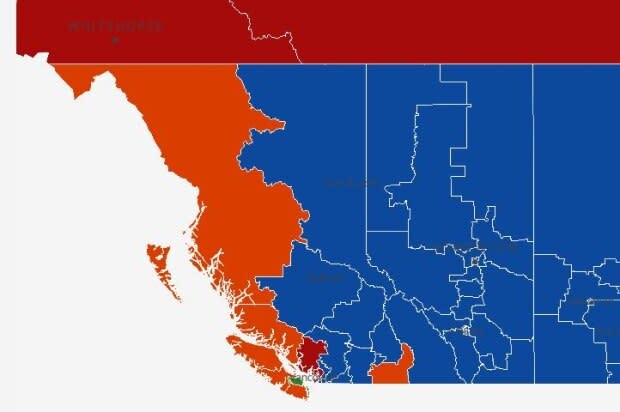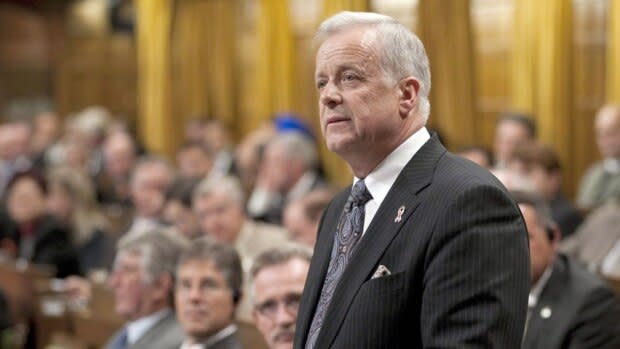'Wexit' talk doesn't stop at Alberta's border with Conservative surge in B.C.
While much has been made of the Conservative Party's sweep of Saskatchewan and most of Alberta in Monday's night election, the blue wave didn't stop at the Rockies.
Instead, it continued into British Columbia's Interior and northeast, parts of the province where support for Conservative candidates ranged from 45.1 per cent in Kootenay-Columbia in the south to a full 69.9 per cent in Prince George-Peace River-Northern Rockies in the north.
Although it's normal for Conservatives to win in these regions, the party also picked up tens of thousands of new votes along the B.C.-Alberta border compared to its performance in 2015.
And according to one Conservative supporter, that surge could be explained in one word: jobs.
"Our province is kind of in trouble," said Kristi Leer of Fort Nelson, pointing to the downturn in the oil and gas industry in her region, as well as the loss of hundreds of forestry jobs in B.C.'s Interior.
"We want answers."
Prince George-based writer Trudy Klassen agreed, adding that she believes people outside major metro areas lean right in part because they can't rely on government for support.
"You live far away from law enforcement. You live far away from government help. So you need to be able to have the freedoms to make decisions ... in your best interests," she said.
While some Conservative supporters believe the way forward is to get more voters in other parts of Canada, others think their future lies in a separatist movement known as "Wexit" — a portmanteau for Western exit from Canada.
Northern B.C. Wexit?
Among those calling for separation is Jay Hill, a former Conservative Party MP for Prince George-Peace River who said voters in his old riding have more in common with their Albertan neighbours than those in and around Vancouver — including a sense of anger at Trudeau's re-election.

"I know for a fact having represented northeastern British Columbia for 17 years in Parliament that the people up there are pissed," he told CBC's As It Happens.
And, Hill said, he supports that portion of the province joining Alberta and Saskatchewan in seceding from Canada, a movement now dubbed "Wexit."
That sentiment was backed by Mackenzie Pollard, an equipment operator in Dawson Creek and the founder of a "Wexit British Columbia" Facebook page connected to the "official" Wexit Alberta movement led by Peter Downing.
"Most people who live here have experienced the oil and gas industry [downturn]," he said. "It's not that we're throwing a tantrum about it, it's our livelihood."
Jason Morris, a political science professor at the University of Northern B.C. in Prince George, says he doesn't expect Wexit talk to go far, pointing to past separatist movements such as the Western Canada Concept Party which managed to win one byelection in 1982 before fizzling out.
"My take is emotions will subside a bit and most Westerners [will] realize there's still a lot that can be done to get better or more enhanced representation with the political system we have," he said.
'Stronger together': Conservative MP
Current political leaders are less open to talk of separation.
"As a nation, I think we are stronger together," Conservative MP Todd Doherty of Cariboo-Prince George told Daybreak North host Carolina de Ryk.
"Our job is to make sure as leaders within our country ... that we are doing everything in our power to hold our country together."

Likewise, Bob Zimmer of Prince George-Peace River-Northern Rockies said he's willing to work with a minority government so long as it means bringing jobs to his constituents.
"I think [Justin Trudeau] can show that by developing projects, that he does care about the west," Zimmer said.
Subscribe to Daybreak North on CBC Listen or your favourite podcast app, and connect with CBC Northern British Columbia on Facebook, Twitter and Instagram.


